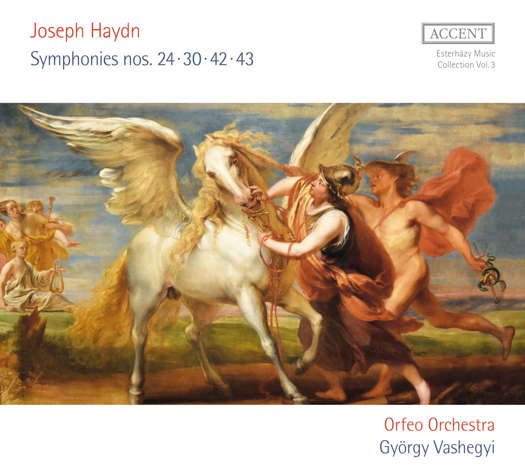
Different Worlds
Haydn symphonies, heard by GERALD FENECH
'Gyorgy Vashegyi ... conducts these absolutely sparkling pieces with formidable authority and unbridled zeal ... and his players respond with some utterly warm performances, brimming with bouncy wit and humour yet equally incisive drive.'
Franz Joseph Haydn (1732-1809) is considered, and rightly so, as the 'father of the symphony'. His more than a hundred contributions to the genre set new standards for future composers, and if one compares his first pieces written for Count Morzini's court in the late 1750s with the last twelve performed in London in the first half of the 1790s the change of dimension and style could not be more telling. At the same time, the traditional focus on the trend-setting quality of Haydn's work and his inner compositional development has inevitably privileged his later more mature works over the earlier symphonic utterances, viewed as just experimental pieces in an evolutionary process that would eventually lead to the 'classical symphony'.
All throughout his long and illustrious career Haydn always considered compositional solutions, weighed their effect, and then moved on, or on the contrary, returned to these ideas and moulded them into a new form, thus gradually developing personal features that made his work unique.
Listen — Haydn: Allegro (Symphony No 24 in D)
(track 1, 0:00-0:56) ℗ 2021 note 1 music gmbh :
Whatever the case, the four symphonies on this marvellous CD should remind one that Haydn's experiments do in no way compromise the quality of his earlier works, which are truly convincing creations in their own right. Indeed, if one compares the opening movements of Symphonies Nos 24 and 30 respectively, which were composed about a year apart (1764/1765), the emphatically Italianate gestures of the former are no less persuasive than the festive church moods of the latter, appropriately nicknamed 'Alleluia'.
Listen — Haydn: Andante (Symphony No 30 in C)
(track 6, 0:00-1:00) ℗ 2021 note 1 music gmbh :
By the same yardstick, listening to Symphonies Nos 42 (1771) and 43 (before 1772) dubbed 'Mercury', one finds oneself in two different worlds, both of which, however, is a joy to be part of, even if many will find the unexpected sound world of the latter more typical of Haydn's infinite inventiveness.
Listen — Haydn: Menuet (Symphony No 42)
(track 10, 0:00-0:56) ℗ 2021 note 1 music gmbh :
György Vashegyi, as in the previous volumes, conducts these absolutely sparkling pieces with formidable authority and unbridled zeal, without ever hindering the graceful flow of the music, and his players respond with some utterly warm performances, brimming with bouncy wit and humour yet equally incisive drive.
Listen — Haydn: Finale (Symphony No 43)
(track 15, 3:38-4:37) ℗ 2021 note 1 music gmbh :
A superb third addition to Accent's Esterhazy Cycle in glorious sound quality and scholarly annotations. I cannot wait for the next helping.
Copyright © 17 April 2021
Gerald Fenech,
Gzira, Malta

CD INFORMATION - JOSEPH HAYDN: SYMPHONIES NOS 24, 30, 42, 43




